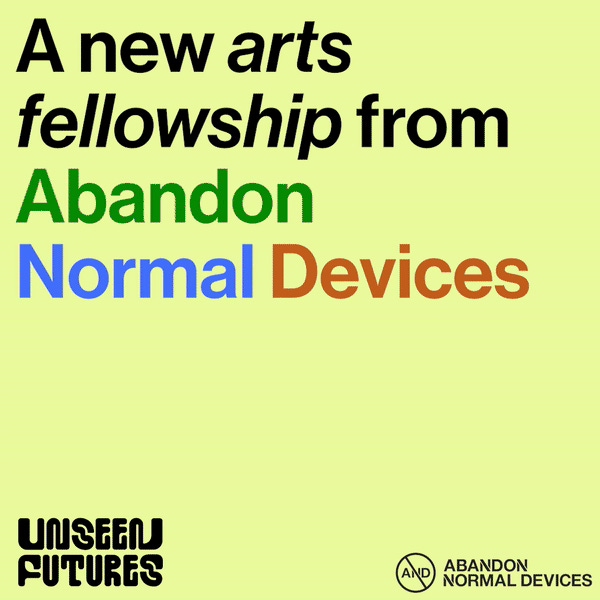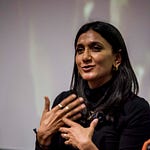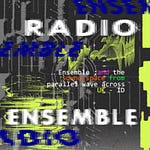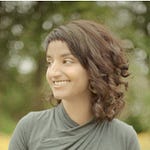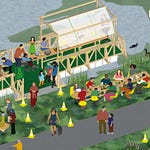Welcome back to the Abandon Normal Devices Podcast. We took a break from podcasting in 2022 to focus on artist-led projects, and now we’d like to share what we’ve been up to.
This is episode 12 of the Abandon Normal Devices/AND podcast. In this episode we are discussing Unseen Futures, our first ever artist-led fellowship programme that ran from September 2022 to January 2023.
Not Your Usual Fellowship is a conversation between three of the fellows Julieta Gil, January Miller and Liz Mputu. They discuss the benefits of an artist-led programme, how to emotionally fund your creative practice, and how to be yourself in a world where artists often need to present a polished version of themselves.
Please note that there is strong language used in this recording that some people may find offensive.
Transcript:
Ruth McCullough 00:14
Welcome back to the Abandon Normal Devices podcast. We took a break from podcasting in 2022 to focus on artist-led projects. And now we'd like to share what we've been up to. This is Episode 12 of the Abandon Normal Devices podcast. In this episode we are discussing Unseen Futures, our first ever artist-led fellowship programme that ran from September 2022 to January 2023. 'Not Your Usual Fellowship' is a conversation between three of the fellows: Julieta Gill, January Miller and Liz Mputu. They discuss the benefits of an artist-led programme, how to emotionally fund your creative practice, and how to be yourself in a world where artists often need to present a polished version of themselves. Please note there is strong language used in this recording that some people may find offensive.
January Miller 01:06
Hi, I'm January Miller, my pronouns are they/them. I am a creative director, and I'm working with Liz on our project Femmes at Large. And so that's how I came to be in the fellowship.
Liz Mputu 01:21
Hi, I am Liz Mputu. My pronouns are she/her, I am a arts and wellness facilitator, a new media artist and a registered nurse. And I am working on Femmes at Large with January. And that is why I'm a part of this fellowship.
Julieta Gil 01:42
Hi, I'm Julieta, I am an artist from Mexico City, who's now living in Oregon, pursuing arts education as well. And I came to AND with just lots of questions. No specific project, just a lot of questions around art.
January Miller 02:08
So I think what I was kind of thinking about, like, with this fellowship, when Liz first presented it to me, because she kind of brought me into the fold. I was interested to see how this was gonna work, like what was it about what we learn. And I was actually really like, happy to find that it was more of like a space to learn, but like we could, it wasn't pressured, you know, like, there wasn't like a huge pressure in anything, it was more of like, okay, learn together, let's discover different things. And I think from like, everybody involved, like all of you fellows, like, I learned so much and seeing so many different perspectives. And it's just been a really cool experience. Like, overall, I enjoyed it.
Julieta Gil 02:48
Yeah, it's been really great for me too. I also didn't really know what to expect, but since day one, it felt like you know, it wasn't really like your usual kind of fellowship, where you have to produce like work or you know, where it's more about just the creating objects, and it was more about just having conversations, and it was great to like really quickly be able to open up to the group and, and it felt like everyone was kind of in that same spot of felt like there was a space where we could just be open and share. Our struggles or the things we want to be working on or just questions that maybe sometimes you're nervous about asking. But it felt like this was just like a pretty safe space to just Yeah, share any authentic thoughts that were going on in your mind. And I think that's very special. Nowadays, I don't think there's that many spaces where you can do that, and where you just get to meet artists from different parts of the world and see their perspectives on life.
Liz Mputu 04:01
How we were given this space to like truly be authentic to our own ideas of what we're experiencing as, as well as this. Because, like when the fellowship first started, like Jan mentioned, we didn't really know like what a fellowship was, and like what to expect out of, like we very much looked at it like a commission and had these like grand expectations of of what we needed to provide and offer and what, AND would then provide and author and it was really complicated at the beginning, almost to a degree that I'm sure it was like nerve wracking, even for them. Because I was just like so late in getting everything in or just uncertain of what we're actually getting ourselves into. So I really appreciated that even right at the beginning like they allowed space for that confusion. And they allowed us to kind of like negotiate together, what this fellowship would then mean, if it wasn't going to be explicitly what they stated. And then like, making space for January to come in was like really huge, because oftentimes institutions, you know, they're very set on, like, what their programming is and what they have decided to be, you know, in their best interest. So for them to really be like, no, like, this is for y'all open it up, I think was like, amazing, because I got so much from being able to share this experience with an artist that I otherwise would be working with, you know, so I thought that was like a great benefit. And I liked that they were able to value us as artists and value our opinions, too.
January Miller 05:48
Yeah, I definitely agree. I think every time input was asked, like, every time they asked for input, or like, you know, what we thought, I think changes really were made or like we were actually considered, which I think is really beautiful. Because a lot of spaces don't fully do that, like, oh, like, Oh, what do you want, but then just kind of do what they want anyway. And so I thought that was really cool. I loved like the freedom to explore what we wanted as well, because I think the more we learned from each other, the more we got the hang of things, we realised what we wanted out of the process. I think, like I just gained so much more knowledge than I even thought I would gain already coming in. It was really cool. I really appreciated it. Yeah.
Julieta Gil 06:30
Yeah, I think there, the fact that it was artist-led, you know, made it a very special thing. Where it didn't feel like we were kind of leading, leading the way. The AND team was kind of just accompanying us or just being, you know, like a support for us to be able to yet lead, you know, the discussion or the topics that we were all interested in. And one, one, I remember one topic that came up, I think it was in the beginning, but there was this question of how do you fund your practice? And that really quickly evolved into a question of how do you emotionally fund your practice? And that's one question that, like, still sticks with me. You know, I, I think what's great about that question is that it's so open ended. And maybe there is no, like, one answer, right, but just to have it as something that's accompanying you like a question that you can refer to back again, when you're feeling I don't know, sometimes I get anxious when we're making work. Right. So just thinking about that is important. And I think that, yeah, that's something that came up during the fellowship that I hadn't thought about before. And now it's always with me.
Liz Mputu 07:56
Yeah, the prompting was definitely stupendous. I felt like we got access to like a lot of great, inspirational work that shaped how we then wanted to move forward, but like the programming, and I think it's great that it was artists lead as well, because oftentimes, people don't trust artists to lead, you know, we're really looked at, and stereotyped as these airy human beings who have half their, you know, leg in one door and their other leg in the other door, and really like not able to be present, and guide in an efficient manner. And all of that is true. And so for them to take that risk, it was really big, because our minds are in completely different dimensions, which is what the beauty of being an artist is, we're pulling from our perspective, and our perspective is unique from that of the world, which we are currently, you know, residing in, we don't see the world the same as we're told to. And that's why we, you know, been summoned to be in the position that we're in, because we help to articulate the nuances and the differences that we're seeing, and we're perceiving. So having like, five to seven artists, in all of their own different dimensions coming together and sharing space to lead, like emphasis on lead is, is something that I hope other institutions will do, that aren't just art based, because I feel like since we are so inquisitive and forward thinking, we're able to project outwardly into the future, while pulling together the past and the present in a way that again is abstracted to our benefit using whatever tools and modalities and mediums speak to us. So I thought that was a great risk.
Julieta Gil 09:58
Yeah, for sure. I think even, even the fact that they're kind of accepting that, you know, institutions, like I think they're setting an example for other institutions just by letting us, you know, direct direct the thing. In a way, I think it's like there's part of an acceptance that there needs to be a change on the side of institutions that are working with artists, but rather than talking about it, they really acted and embodied that change. Right.
January Miller 10:28
Yeah. I would agree. I think like, I don't know, like, like, yes, like, I think institutions are great for like giving opportunity, but I think they do need to be more cognizant of the artists that are like, helping them as well, you know, so I think like, This programme was really great in that, because I felt that I felt appreciated, I felt like my voice was heard. And I think that's just like, really important in a space where like, sometimes capitalism rules or like money rules, and like, you don't really, it's kind of like art is like a product instead of like, actually, like expression sometimes. And I feel like in this space, it felt more like, Okay, this is an expression, but how can we make it more accessible to people like, or how can we make it like easier as an artist to get our workout, but also, because compensated like, I think they were able to, like, hit on so many different aspects of art that benefit both sides to which was really cool. But even the discussion on how to be more eco friendly with digital art, you know, and like different ways to go about that. I think that's huge, because we didn't have to learn that we didn't have to, like, dig into that. But it's like, going into those social structures and thinking about those things, I think made this institution or this programme, like a lot different from others. Yeah.
Julieta Gil 11:50
Yeah, I definitely think it's affected me, or the way that I'm approaching my practice. And maybe it's in very subtle ways, or maybe it's in very kind of hidden ways, right. But I do feel like it kind of accompanied me during, you know, a time of just forming ideas, and it's going to kind of stick with me, even even as this fellowship ends, I think that it did leave, like key key questions or key discussions that I can kind of go back to.
Liz Mputu 12:27
No, you're right, I'm gonna miss y'all too, like now that it's actually coming to the end. I'm thinking about it. And the way you're both articulating this, I'm like, wow, we really were like, at art school. All all over again, maybe even for, for some of the people involved in, I really missed that environment, because you get access to so many resources. And my favourite part about art school, to be honest, was critique. I know everyone like them nervous about critique days, and, you know, it brings up a lot of anxiety. But this kind of like, gave me that same vibe, where it's like, okay, we're able to present our thoughts, unfiltered, raw, you know, and get feedback. And it doesn't have to be about like, even one specific piece I'm creating, but all of these ideas I have, and all of these concepts that I refer to when I'm creating, or maybe not even when I'm creating, but like you mentioned, when we were doing, you know, how do you emotionally fund your practice, even like, your social, your personal and social practice, gets a bit of tools as well. So it was really valuable. I think, even in the in the places where there was like, maybe not enough organisation, and things were kind of floating in the air, like, even the places where there was a bit of faulty, and we couldn't quite get together. I think it spoke to the trust that we were lending one another to build something versus like the rigidity of a system that we had to comply with. Yeah, so I thought that was just nice to see was merciful to see, you know, I think for me, personally, I also would have liked a little bit more structure because I'm already so all over the place. And I think y'all got to see a little bit of that. But it was nice to see like my institution be flexible and malleable.
Julieta Gil 14:34
Yeah, it almost became like an experiment on, you know, an institutional structure and almost like what happens if you just let go of control as an institution? What does it turn into? And I think that for me, that was maybe the most exciting part to see that. You know, it doesn't fall apart. It doesn't fail. It actually, you know, got a lot more interesting because it was really like a group of people that made that space function, right? It was the artists and the whole team at AND kind of being there. But there was not like this one kind of, yeah, decision maker or leader or entity controlling what was happening. So it was really nice to see that it can work. And it would be exciting to just see other institutions like maybe art museums, you know, I don't know, have take fellowships that are kinda like this. And like, I wonder if this kind of structure became an example, not just for artists, but also for institutions to learn to be different.
January Miller 15:45
Yeah, I think this is like really cool. Because then just like what you were saying, it made me think of like, what would it look like if institutions and artists built community like together? Like, what would that look like? And I think, because I know what this experience, I did feel that sense of community because it's like, we were all coming together. Like, you know, especially when everyone was doing their workshops, we come together, we talk about it, we talk about how it influenced us, and maybe different changes or what ifs, like, but it was very positive. And I think it created like a really safe space. And I think that's also a really important part when it comes to like being vulnerable with your art and your expression and how you did things. And it was just really cool. I think that it would probably breed better art and better experiences, like for everyone involved. If I think institutions and artists alike come together and like a healthy community like space, communal space.
Liz Mputu 16:41
Yeah, no, I'm just, I'm honestly thinking about how I'm like, clearly like a glutton for punishment. Because I feel like, you know, there is so much more to that, like, I wish we could continue to contribute. So I'm just wondering how like, we now grow, and like, when we walk away from this, like, what are we gonna take as far as how we organise with one another, how we organise with like, our peers, you know, how do we continue what this infrastructure has laid out for us, as far as like, even a routine in our practice, like, it was nice to have, like, a set day, a set time regularly that like, I'm committed to this moment. And I feel like for myself outside of that, yeah, I have like a bit of routine. But when it comes to like art, for some reason, where I feel like it's organic, like, I'm very much like, oh, suddenly I've been like stricken. Let me go outside and dance for hours and see, like, what the gods have to tell me, and then I'll come back and see what comes of it. But this was a way of like, producing, and again, collaborating, which I think taught me a lot. I know Jan is probably really grateful for this too. But like how to create, like, co create with people, you know? And like you said, let's see what, what comes of it naturally without feeling like okay, and if you don't produce in this way that I expected you to now you're being penalised and punished, or it's a failure. And one thing that I really appreciated that Julieta, you brought to the workshops, was us really learning how to like, adore failing. And embracing, Yeah. So that was great to gain, like from you. And again, like, so how did you keep those conversations going? Like, how do we not lose conversations and connections like these without also doing the thing where everyone's like, you know, have a great summer at the end of school, I promise, I'm gonna write you every day. And then you know, and then it's like, the next seven you see each other, you know, without over committing or under committing? How do we continue to share and in building one another like this?
January Miller 18:59
Yeah, I think that's a really good point. I don't know if maybe, like, we could keep the discord going, like, hey, how are you guys doing? Because I definitely, like would love to, like, see where everybody goes with their art and the new things that they do and check in or maybe ask questions. So like, I think that that is an important point, Liz, like, how can we still keep the good vibes going? Because I think we did build, like some sort of relationship, you know?
Julieta Gil 19:27
Yeah, for sure. I think we built a great relationship with it feels like we really built a support network, you know, and a space where we can share ideas and yeah, talk about failure. I'm all for that. And, yeah, I think, definitely, it's something that we shouldn't let go of, you know, because it did take, you know, we all put in our presence. I feel like we were all like fully present when we met during the fellowship. We put in just like sharing, as you said, Jan, like our most vulnerable aspects, right? Like we put in a lot of things that I highly value. And I think that that's what maybe made, you know, the fellowship have like this. Yeah, like this special aspect of just like feeling in the space where you want to be in. So I agree, I think I'd be down for keeping the discord or just thinking of ways that we can still keep in touch. I'm super curious to see where your guys's work is going to Femmes at Large, I unfortunately missed the festival, the day that it happened, but I'd love to see you know where that is going. It was such a powerful idea. And it was so nice to hear. You share it during the fellowship, too.
January Miller 20:53
Thank you, I really appreciate that. I could send you the video if you're ever interested because we saved it. So I could, I'll send it to you after. Yeah. I think it's cool, because I hadn't even thought about doing the idea until this fellowship because Liz and I thought that we had to create something for this. Well, can we do it it just kind of came. So I'm grateful for for AND and for this experience, too. Because it birthed that idea to in a sense. So yeah, like, I'm excited to see where it goes. And I'm thankful that like this helped to ignite the idea too as well. And just to keep you guys, you know, along for the ride for sure. Yeah.
Julieta Gil 21:38
What would you say to any of the future fellows?
January Miller 21:44
Future fellows, I guess maybe come in without, like, any expectations. Because I think when we came in with expectations, it just like it took forever to like, I don't know, figure out what this was about. I think when you come in with no expectations, and you're just willing to be and be a part and learn. I think you just get so much more out of it. And more new questions and ideas are like come up that you want to explore when you just kind of like come with, you know, no expectations.
Julieta Gil 22:15
Yeah, I think I would agree with that, Jan. I think that's a Yeah, that's a good piece of advice. No expectations. And yeah, just being open to whatever, right. Whatever it turns into whatever monster turns into.
Liz Mputu 22:32
Exactly. Yeah, definitely that, I feel like coming into with expectation really did stall the process. Yeah, you're, you're moving one way and people are moving another way. And because you're so stubborn with what your idea of the experience is supposed to be, it takes you so long to pivot towards the actual path. Thats so real. Yeah, I feel like you said what is it the advice to other fellows, or I think you'd probably be like, I Oh, you know, I would say keep, keep art rebellious, like, you know, keep the art world rebellious. I love that this is like the one industry that you really can boldly, like, show up as yourself and treat it like the wild wild west and go very rogue. And just like question everything, you know, you know, repurpose materials, you know, challenge like the form of the environment in the spaces that you're in, and like, never die your voice down or subdue it. Because when we're not in these spaces together, you feel like you have to minimise who you are, you know, so much. And that's why I feel like all of us love art is because it's the one place where you get to like explode your personality onto the canvas at the show, like at the Kiki with your friend, like you get to just like be loud and booming. And I feel like with like the age of social media, and how people are starting to like recontextualize how to gain capital. And because like the blur between like what a content creator is and what an artist is, is starting to become like, really confusing. I feel like artists are starting to curate their art for their audience, like in a way that isn't honest. Because they just want like institutions to see them and be like, hey, like they're like almost virtue signalling that they're an artist like, hey, like I'm here, like, look at my perfect package. And I feel like I would want the fellows to know that like, you don't have to do that. I don't feel like any of us, packaged ourselves or performed or like, auditioned to be an artist, especially to gain opportunities. I think that like we all really showed that we're just curious beings. And we're, like, attracted to exploring, like those curiosities at a multitude of ways. So I, that's all I would say, as it just keep being yourself, like, don't feel like you have to change or to trim the stuff like, just be an artist. Keep it loud, like keep it raunchy.
January Miller 25:37
Yeah no, I definitely I definitely agree with you Liz, I think just coming as you are is beautiful. And I think this fellowship did a really great job of doing that. So I'm appreciative that we were able to just come as we are, and I appreciate the diversity, I think there was, like, different people from different parts of the world with different experiences. I learned so much. And it was just really cool to collectively come together and have the freedom to express that without judgement or feeling like is this you know, you know, how's this gonna be? I felt very comfortable in doing that. And, and I think that's really important, especially now, like, I think it's really important to like, have diversity and inclusion. And they definitely, like facilitated it and showed newer ways that we could do that in our work as well, which I thought was really cool.
Julieta Gil 26:24
Yeah, yeah, that was great. Also, just being exposed to artists whose work maybe we weren't familiar with, that, that for me was so special, like to know that now. I'll be following your projects, or Uma'ss projects or Eternal Engines projects. And almost like I have this special kind of insights of, you know, what they're making, because I got to like, just have really great conversations with them. So it makes it a little bit more personal to you know, to know that wherever they go, like to treasure that this moment that we shared in that we had, yeah, that was really special to get to meet all of you, for sure. I think that's my biggest takeaway, for sure. Just to have the opportunity to connect with ya'll.
Liz Mputu 27:21
Likewise, Julieta, likewise. The value is like, it's in the relationships
January Miller 27:28
Mhmm.
Julieta Gil 27:28
For sure.




